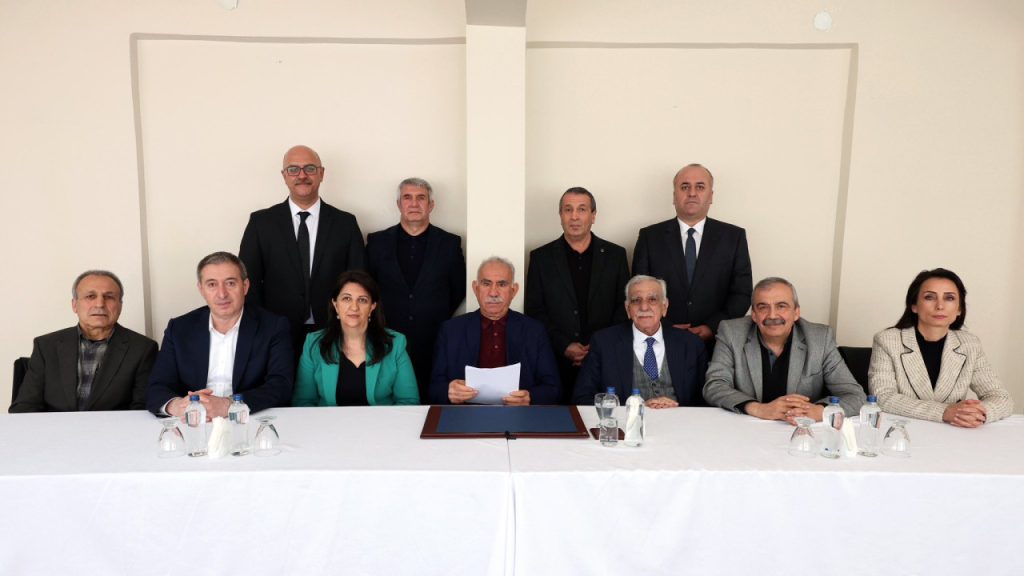On March 1, the Kurdistan Workers’ Party (PKK) announced a ceasefire in response to a call from its leader, Abdullah Öcalan. This decision aligns with Öcalan’s earlier message urging the necessity of disarmament and political integration with the state. In this context, the PKK affirmed its commitment to not conduct armed actions unless provoked and emphasized the importance of establishing a conducive environment for democratic engagement. The push towards disarmament has sparked discussions within political circles on the implications for Kurdish political representation and ongoing peace efforts in the region.
| Article Subheadings |
|---|
| 1) Overview of the Ceasefire Announcement |
| 2) Details of Öcalan’s Message |
| 3) Implications for Kurdish Politics |
| 4) The Role of the İmralı Delegation |
| 5) Future Prospects for Peace and Disarmament |
Overview of the Ceasefire Announcement
The PKK’s announcement of a ceasefire on March 1 marks a significant milestone in the ongoing struggles surrounding the Kurdish political movement in Turkey. The group’s statement emphasized a commitment to halt armed conflict unless confronted with aggression, reinforcing its determination to align with the directives set forth by their leader. This declaration was made public through an official communication from the PKK Executive Committee, effectively acknowledging Abdullah Öcalan’s advocacy for peace and the cessation of hostilities. By declaring this cessation of violence, the PKK highlights its intentions to pursue peaceful negotiations and to engage constructively in the political landscape.
Details of Öcalan’s Message
In his April 27 message, Abdullah Öcalan called for disarmament and emphasized the need for a suitable environment for democratic politics. He expressed a strong conviction that all groups, including the PKK, should be willing to lay down arms, dissociate from past grievances, and engage with the state constructively. This message indicates Öcalan’s intent to take historical responsibility regarding the future of the PKK and its relationship with Turkey. He urged the PKK to convene a congress aimed at redefining its mission, aligning with the contemporary political environment, and contributing positively to democratic consolidation in the region.
Implications for Kurdish Politics
The ceasefire and disarmament call come at a pivotal moment in Kurdish political representation within Turkey. By choosing this path, the PKK opens the door for potential engagement in political processes beyond armed struggle, which could significantly alter the dynamics between Kurdish interests and the Turkish state. It raises important questions about representation and legitimacy, as various factions within the Kurdish community may react differently to these developments. Additionally, there is wider apprehension about whether the Turkish government will reciprocate this peace overture, particularly in light of historical tensions and legislative hurdles faced by Kurdish political movements.
The Role of the İmralı Delegation
The İmralı Delegation plays a crucial role in facilitating communication between the PKK and Öcalan, who has been imprisoned on İmralı Island since 1999. Following their recent meeting, the delegation released a summary of Öcalan’s directives and noted the importance of establishing a legal framework for a peaceful resolution to the conflict. This framework is critical for ensuring that political participation is recognized legally and institutionally. The delegation’s ongoing engagement emphasizes the importance of dialogue in the peace process and highlights its position as mediators between state authorities and Kurdish representatives.
Future Prospects for Peace and Disarmament
Looking ahead, the ceasefire could signify a more profound transformation in the relationship between the PKK and the Turkish state, contingent on the political environment established. Should the government respond positively and implement committed reforms recognizing Kurdish rights, there is potential for a sustainable peace process. Conversely, failure to facilitate these conditions could lead to a resurgence of hostilities and mistrust. The PKK’s actions and Öcalan’s messages pave the way for potential negotiations, prioritizing dialogue over conflict in an attempt to reshape the Kurdish political landscape.
| No. | Key Points |
|---|---|
| 1 | The PKK declared a ceasefire effective from March 1 in response to Abdullah Öcalan’s leadership. |
| 2 | Öcalan emphasized the necessity of disarmament and the integration of the PKK with state politics. |
| 3 | The ceasefire opens potential for constructive engagement between the PKK and the Turkish state. |
| 4 | The İmralı Delegation plays a vital role as mediators in the peace discussions related to Kurdish representation. |
| 5 | Future political reform and willingness from both sides will determine the sustainability of peace efforts. |
Summary
The ceasefire declared by the PKK marks a pivotal moment in the long-standing conflict in Turkey. As Abdullah Öcalan calls for peace, disarmament, and political reconciliation, the future of the Kurdish movement may hinge upon the Turkish government’s response. The potential for constructive dialogue rests on the ability of both parties to move past historical conflicts and towards a framework of mutual recognition and cooperation. As the situation develops, the commitment to achieving lasting peace will be scrutinized by observers and participants alike.
Frequently Asked Questions
Question: What is the significance of the PKK’s ceasefire declaration?
The PKK’s ceasefire signifies a shift towards potential dialogue and peace negotiations with the Turkish state, reflecting a willingness to abandon armed conflict for political engagement.
Question: What role does Öcalan play in the current political context?
Öcalan is central to the Kurdish political narrative, suggesting pathways towards disarmament, reconciliation, and greater political representation for Kurds within Turkish society.
Question: How has the İmralı Delegation influenced the peace process?
The İmralı Delegation acts as an intermediary that facilitates communications between Öcalan and the PKK, ensuring that the directives discussed are transmitted effectively while advocating for Kurdish rights and legal recognition.


